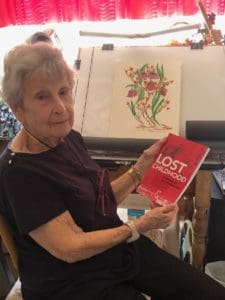Meadows Resident Honors Late Husband by Continuing to Tell His Story

Beneta Silberstern was caught off guard. Not long after moving to St. John’s Meadows earlier this year, she started getting knocks at her door and questions about her late husband. “I still don’t know how they found out about it,” recalls Beneta. “But they were interested in Henry’s story and wanted to read his book.”
Beneta was happy to oblige, and sold several copies of Henry’s memoir—Lost Childhood—to her new neighbors. In fact, Beneta takes great pride in honoring her husband and the memory of his harrowing experiences during the second World War in Europe. “He was an exceptional person and his message is still important,” she explains. “He taught so many people—especially kids—and he was so very good at it.”
Henry’s story was an exceptional one. He was born into a comfortable life in what is now the Czech Republic. The rise of Hitler’s Third Reich and the Nazi occupation of Prague in 1939 changed his family’s life dramatically. At the end of 1942, Henry and his mother were transported to a transit camp in the Terezin Ghetto. Only 1% of the estimated 15,000 children who passed through Terezin during the war would survive.
Henry would survive five concentration camps throughout Poland, Austria, and Germany during the war. In July of 1944, he was selected as one of 89 boys out of 500 who were spared at Birkenau camp, part of the Auschwitz concentration camp. The group of survivors—known as “the Birkenau Boys”—have been written about and celebrated in the years since the end of the war. Henry and his fellow prisoners were eventually liberated on his 15th birthday at the Bergen-Belsen camp in Northern Germany.
After years of hesitation, Henry finally began speaking about his childhood experiences as a prisoner and slave laborer in the 1970s. Having emigrated to the United States and settling in Buffalo, Henry first shared his experiences with family members and close friends before agreeing to speak in front of students throughout the area. When he and Beneta moved to Rochester in the late 1990s, he continued to share his story with thousands of students. “I have hundreds of letters from students who wrote to Henry after hearing his story,” says Beneta.
Towards the end of his life, Henry finally completed a memoir chronicling his wartime experiences. Soon afterwards, a Buffalo journalist who had reported on Henry decided to produce a documentary based on his journey and a reunion with “the Birkenau Boys.” That documentary will be screened by Rich Newburg, the film’s director, on Friday October 19 at St. John’s Meadows.
According to Beneta, the idea to screen the Lost Childhood film evolved as St. John’s Meadows residents continued to show interest in her husband’s remarkable story. “Despite what he lived through at a young age, Henry lived a good life,” she explains. “He had a ‘to do’ list and everything was done.”
At the top of Beneta’s own priority list is making sure her husband’s legacy endures.
